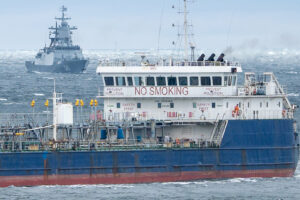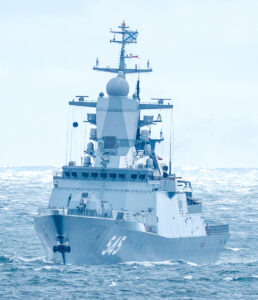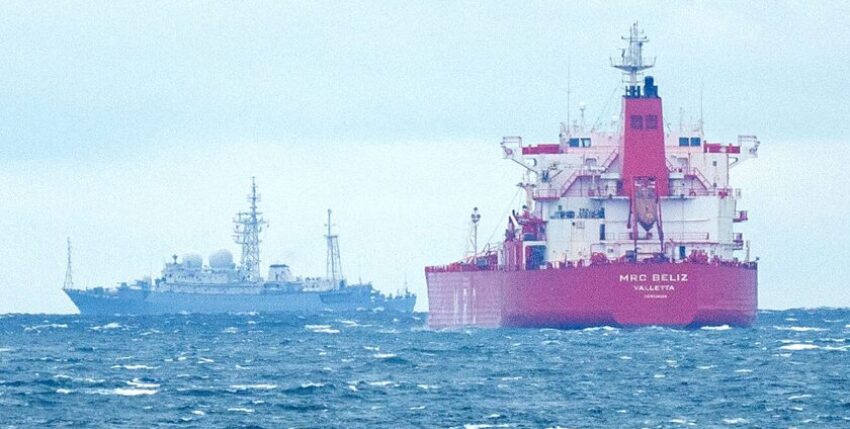At the end of last week, unusual movements by the Russian navy and Russian state vessels were once again observed right on the doorstep of Kiel Bay in the Fehmarnbelt. On 22 June 2024, the Russian oil tanker (RFS) "Yaz" and the Steregushiy-class corvette RFS "Stoikiy" passed through the Fehmarnbelt in the direction of St. Petersburg. The corvette had previously passed the Danish Straits heading north from the Baltiysk naval base on 19 June 2024. It was assumed that the RFS "Stoikiy" was deployed to protect the oil tanker RFS "Yaz", which was approaching the Skagerrak at the time.

The tanker "Yaz" moved north from Tartus (Syria) at the end of May and passed Gibraltar on 13 June 2024, followed by the Strait of Dover five days later. Before the oil tanker passed Skagen on 21 June 2024 and entered the Baltic Sea, the rendezvous with the Baltic Fleet battleship took place in the Skagerrak the day before. After a night passage through the Great Belt, the small convoy passed the Fehmarn Belt on 22 June 2024 in the direction of the Central Baltic Sea with destination St. Petersburg.
The Russian convoy was escorted through the Fehmarnbelt into the Pomeranian Bay by the FGS "Bayreuth", an operational vessel of the Federal Police Sea. The forces of the Federal Police are currently under great strain due to the numerous movements of the Russian navy and Russian state vessels. On the doorstep of Kiel Bay, where the international naval units of the large-scale manoeuvre BALTOPS gathered at the end of last week and prepared to enter the Kiel naval base on Friday, one of the Russian Navy's most powerful reconnaissance ships had already taken up position on Thursday morning, 20 June 2024.

The RFS "Vasiliy Tatishchev" has taken up a roadstead in international waters north-west of Fehmarn and south-east of the Danish island of Langeland to gather information. The 91.5 metre long and 3,470 tonne displacement vessel was monitored around the clock by the Danish Navy and the German Federal Maritime Police until it left this sea area. After the majority of the NATO ships with the strongest combat capabilities, which were visiting Kiel Week after the end of the manoeuvre, had made their way back to their home ports or the next operational areas on Monday afternoon (24 June 2024), the Russian reconnaissance unit moved eastwards later in the evening on the same day.
What else is remarkable: While the "Vasiliy Tatishchev" was carrying out its information and reconnaissance activities for five days, the German survey vessel FGS "Deneb" of the Federal Maritime and Hydrographic Agency (BSH), among others, monitored the seabed in the corresponding sea area as part of its mission.
Text/Photos. Michael Nitz Naval-Press-Service









3 responses
Dear panellists, I think you both have a point. Of course it is a task of the navy to observe military activities off our coasts and, if you want to put it that way, to shadow foreign warships and auxiliary vessels in this area. This has nothing whatsoever to do with the civilian, police tasks of the Federal Police (Maritime Police). Their task is to determine whether such vessels are complying with the law. The BPol (See) does not investigate military activities.
Due to the tightened security situation, the navy and BPol (sea) are now coordinating much more closely than in the past, and the BSH is obviously also involved in this coordination (FS Deneb). The important message to the Russians is that the German authorities are keeping a close eye on them.
The navy used to have more of its own capacity for such missions, e.g. always a Baltic Sea rescue boat. At present, there are simply too few flagstaffs for this. This is one of the reasons why it is planning a larger number of optionally manned surface vessels in its Course 2035+ concept. The aim is to be able to show more naval presence in our own waters again.
Incidentally, I don't think the Russians are laughing their heads off at our presence. The fact that they have an old tanker coming from the Mediterranean accompanied by a corvette shows that they take us very seriously. They are no longer sure how we will react to such a transit, which used to be a problem-free standard. I assume that the situation on board was more tense than a laughing matter.
Why was the shadowing carried out by a BP See ship? Did the navy have "nothing more to hand" (because of Kiel Week) or was "de-escalation ordered" (police boat instead of warship)? I don't think that's a good thing, I'm sure it only caused the Russian crew to make fun of the Germans.
Dear Captain Lieutenant of the Reserve Roesner,
As a former naval officer, you know that the armed forces are deployed for defence under Article 87a of the Basic Law and that deployment within the Federal Republic of Germany is governed by Article 35 of the Basic Law (mutual legal and administrative assistance).
Ergo, it is not a task for the navy in peacetime and therefore has nothing to do with "de-escalation ordered". According to the Federal Police Act, it is simply the task of the Federal Maritime Police to protect the external maritime borders of our country. This also includes the monitoring and control of cross-border traffic at the Schengen external maritime border and the monitoring of sea areas and shipping traffic in the Baltic and North Sea with regard to compliance with shipping police regulations outside the territorial sea.
The Federal Police Sea has an informative link:
https://www.bundespolizei.de/Web/DE/03Unsere-Aufgaben/05Grenzpolizei-auf-See/Grenzpolizei-auf-See_node.html
With kind regards
Klaus Klages
Editorial team marineforum.online